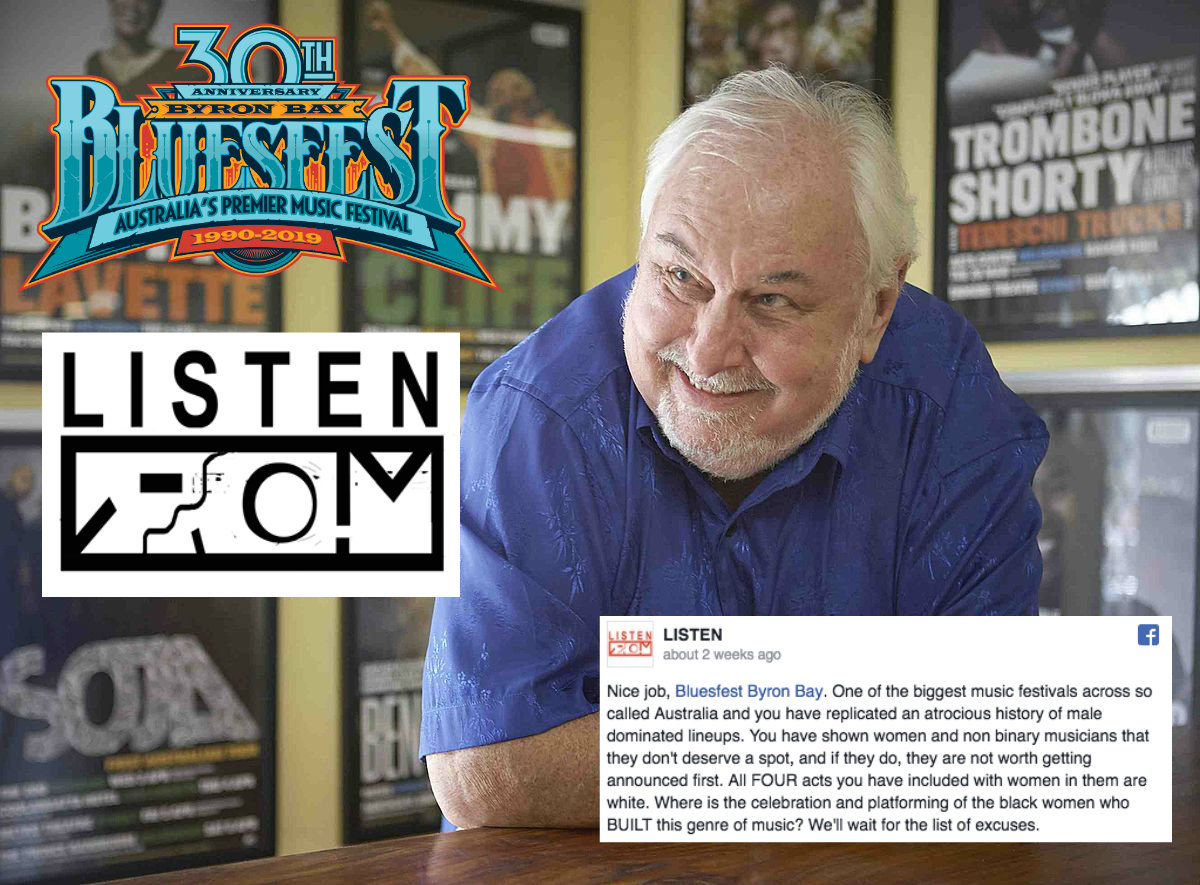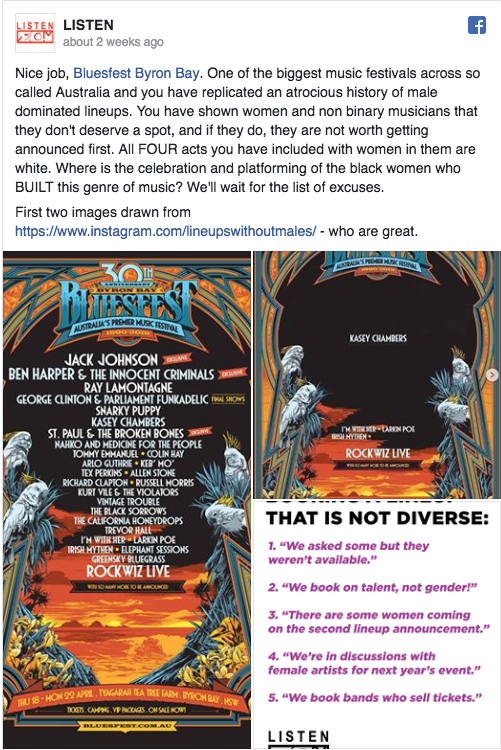Bluesfest’s Peter Noble & LISTEN on the right and wrong ways to deal with gender balance on lineups

Earlier this year, 85 European and UK music festivals announced a target to achieve a 50/50 gender balance on their bills by 2022.
It was a splendid target, of course, but in the debates that followed, it was obvious that there was no cookie-cutter solution.
Comments from female musicians ranged from: “As long as the festivals really want to do it, I don’t want to be token” to “it would be really nice to be in an environment where I am supported” to “There are so many great undiscovered female musicians who should be given a chance.”
The dialogue from promoters was “will quotas really solve the problem?” to “I’m not sure there are enough females to fill the to headline slots” and “Yes, but we can build them up from smaller stages to headliners.”
Conversations on the issue at Australian conferences and forums adopted a similar range of responses.
In the last few weeks, announcements by two festivals – Bluesfest in Byron Bay and Unify Gathering in Victoria – were met with criticisms of gender imbalance.
LISTEN speaks
Bluesfest’s first artist lineup was described by Melbourne-based inclusion activist group LISTEN as “a missed opportunity”.
LISTEN stressed that it has no issue with the festival itself, which had in the past has showcased women, queer and POC artists.
“Our issue is with the message repeatedly sent by Australian festivals that women and non-binary artists, especially those who are Indigenous and artists of colour, do not deserve to be announced first.”
LISTEN’s full statements on Bluesfest can be found HERE.

LISTEN’s Xanthea O’Connor tells TMN, “I found it disappointing there were few women listed in the lineup, and absolutely no women of colour.”
Especially, she adds, when it set the tone for Bluesfest’s 30th-anniversary celebrations in 2019.
Bluesfest director Peter Noble says his first announcement for 2019 was “hijacked”.
“I’ve been given a script for what an announcement should be, colour-wise and gender-wise.”
He goes on to explain, “For me, the first Bluesfest announcement was a branding statement.
“As in: ‘Here are some great singer-songwriters such as Ben Harper, Jack Johnson and Ray Lamontagne, and there’s also George Clinton who is coming for the last time before he retires.
“I also wanted to make a statement by including Tommy Emanuel, Colin Hay, Richard Clapton, Black Sorrows and Russell Morris.
“These acts don’t get booked on triple j presented events.
“We have to be careful in this business that we’re not always looking for the Next Big Thing.
“There are plenty of artists who’ve been treading the boards for 30, 40, 50 years and still doing great.
“That’s an important part of this industry, and ageism does creep in.”
“Why should I go broke?”
Noble is furious that “sausage factory” comments on social media seemed unaware that Bluesfest’s organisation has one of the highest rates of female executives in management roles in the music biz, and that Bluesfest’s performers have been highly diverse since day one.
His argument: calling for quotas of any kind is totally at odds with the economic reality and pressure of having to continually draw huge crowds each year.
“We book artists on their drawing ability so we can sell as many tickets as possible.
“We also book them based on the responses to our surveys about the acts that the audience want to see.”
Bluesfest’s audience is traditionally leaning towards more women, hovering between 55% and 57%, depending on the year.
Two of the acts in the first announcement were among the four most consistently requested by Bluesfest’s crowd.
“If we can’t deliver the kind of bill our public wants, then… In the end this is a business, and it’s my money.”
Noble agrees that women are under-represented in live music.
“But you can’t run the music industry on a quota system. The agents of major acts in America have never heard of such a thing.
“This is a serious issue, of course, and I am aware of the low representation of women at gigs.
“But why is it my fault, why is it my issue?
“Maybe the government will give me some money for my losses, doing this for gender inequality.
“Why should I go broke?
“What I suggest to LISTEN is: put on your own festival of this size, and see the difficulty of what you’re asking.”
One of the things they’ll learn, he reckons, is that it is virtually impossible to control the make-up of the performers.
“We only have a 20% success rate of the artists we go for [to book]; they have other commitments or recording. These are out of my control.”
And then there are some who pull out at the last moment.
“I had Angelique Kidjo confirmed but [another festival] came in and offered more money.”
Bluesfest’s tradition is to enlist emerging female performers, usually from the Byron region.
“What happens if, at the last minute, I’m offered Carlos Santana or the Dave Matthews Band?
“Do I turn them down because Jen Cloher wants a gig?”
LISTEN’s O’Connor responds: “I absolutely understand the point that he’s making there. It is a difficult economic climate for everybody.
“I disagree, though, that there are no women in music who could have an equivalent economic impact on a festival.
“In my opinion, it’s not a valid response.
“I do agree that it’s a wider problem. Women need to be represented in media more, in all areas of industry.”
Addressing the problem
A number of strategies are in place to balance gender inequality
In Australia, there is a growing trend for major female musicians to instruct their booking agents that an event must have a gender quota before they agree to play.
British festival promoter Melvin Benn – whose festivals including Wireless were among those signed to reach 50:50 – has tried to overcome the relatively small pool of female artists by launching a project called ReBalance.
It provides 36 female artists with one week’s studio recording time over the next three years to enlarge the pool.
LISTEN has, on its website, databases of women and non-gender-conforming music people – musicians, sound engineers and producers, among them.
These are sent out to agents and promoters who might be looking for such creatives.
O’Connor welcomes the chance for LISTEN to sit down with bookers, promoters and venue operators as well as other members of the music industry and media, to thrash out ways for greater representation.
It is necessary to allay any fears that promoters might have that it is financially not viable to book female acts, “to dig deeper into why that exists, continue discussions to try and figure what areas do need funding [as a safety net], and why this very clear inequality still exists when the conversation is so prevalent in the media.”
LISTEN has successfully lobbied and written a policy document for a taskforce against sexual harassment and assault in music venues, which is now government-funded and implemented across Victoria.


































